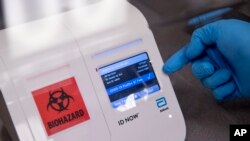U.S. intelligence agencies are dismissing at least one theory about the origins of the coronavirus pandemic, saying evidence shows the virus was not engineered in a Chinese laboratory.
But officials say they are still looking into whether the outbreak was triggered by human contact with animals or whether it began as the result of some scientific accident.
The U.S. intelligence community “concurs with the wide scientific consensus that the COVID-19 virus was not man-made or genetically modified,” the Office of the Director of National Intelligence said in a rare public statement on an ongoing investigation Thursday.
“As we do in all crises, the Community’s experts respond by surging resources and producing critical intelligence on issues vital to U.S. national security,” the statement said. “The IC (intelligence community) will continue to rigorously examine emerging information and intelligence to determine whether the outbreak began through contact with infected animals or if it was the result of an accident at a laboratory in Wuhan.”
The Chinese government-backed Wuhan Institute of Virology has denied allegations it was the source of the initial COVID-19 outbreak, and many experts have said the virus most likely made the jump from animals to people in a nearby wildlife market.
The White House has been demanding a more thorough investigation into the origins of COVID-19. U.S. President Donald Trump has repeatedly cast doubt on statements from both China and the World Health Organization.
On Wednesday, Trump told reporters he had already seen some of the findings from the intelligence community’s probe.
“It's coming in, and I’m getting pieces already. And we're not happy about it,” he said. “We are by far the largest contributor to WHO, world health, and they misled us.”
“Right now, they're literally a pipe organ for China. That's the way I view it,” Trump added.
U.S. Secretary of State Mike Pompeo Wednesday also questioned China’s transparency, and hinted Beijing may be continuing to put the world at risk.
But during an interview with a local radio station in Iowa, Pompeo declined to go as far as the president in his assessment of the virus’s origins.
“We don’t know precisely where this virus originated from. There are multiple labs that are continuing to conduct work,” he said. “We don’t know if they are operating at a level of security to prevent this from happening again.”
Talk that the COVID-19 virus was created in a Chinese lab, or escaped from a lab, has persisted for weeks, as have other theories, many of which have been discredited as rumors or as part of disinformation campaigns.
But Thursday’s statement from the Office of the Director of National Intelligence would appear to indicate U.S. intelligence officials have come to a better understanding of the pandemic’s origins.
Two weeks ago, a U.S. intelligence official told VOA that while agencies were “actively and vigorously tracking down every piece of information,” the community had “not collectively agreed on any one theory.”
Reaction to statement
Some former U.S. intelligence officials, though, are viewing Thursday’s statement with a degree of suspicion, pointing to what they see as the president’s ongoing efforts to politicize the U.S. intelligence apparatus.
“It certainly is unusual, and reflects the politically charged nature of the topic as the Trump administration tries hard to deflect attention from its own performance during the pandemic,” said Paul Pillar, a former senior CIA officer who has been critical of the administration.
“The statement appears to be a compromise that makes the IC [intelligence community] appear to be working objectively without pouring cold water on the White House's favorite rhetorical line about Chinese malfeasance,” said Pillar, now with Georgetown University.
Others, however, see the statement as a smart move, given the onslaught of disinformation that has surrounded the pandemic.
“[It’s] doubtful that this was spin or U.S. disinformation,” said Larry Pfeiffer, a former CIA chief of staff and former senior director of the White House Situation Room, who like Pillar has been critical of the White House’s handling of intelligence matters. “I give the ODNI credit for stepping up to the plate to add some clarity to the situation.”
The statement may also portend a greater public role for U.S. intelligence agencies going forward.
“These are trying times,” said Daniel Hoffman, a retired senior CIA officer. “There’s a lot of disinformation, misinformation and ignorance.”
That informational fog, according to Hoffman, is only compounded by China’s refusal to quickly and transparently come forward with all of the information it has on the origins of the virus.
“We’re relying on our intelligence community to fill in the gaps in what we know,” he said.





